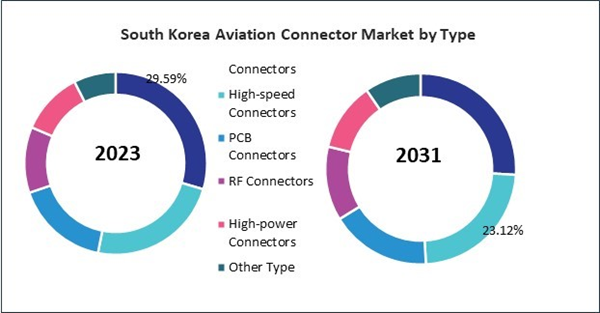The China market dominated the Asia Pacific Aviation Connector Market by country in 2023, and is expected to continue to be a dominant market till 2031; thereby, achieving a market value of $701.8 million by 2031. The Japan market is exhibiting a CAGR of 6.7% during 2024-2031. Additionally, the India market would register a CAGR of 8.1% during 2024-2031.
The adoption of aviation connectors has accelerated in recent years, driven by several key factors tied to the broader aerospace industry. One primary driver is the global surge in aircraft production, particularly in the commercial sector, as airlines expand fleets to accommodate rising passenger traffic. The high air travel has spurred demand for connectors supporting the advanced electrical systems of next-generation planes like the Boeing 737 MAX and Airbus A320neo. Additionally, the shift toward more electric aircraft (MEA) architectures - where traditional hydraulic and pneumatic systems are replaced with electrical ones - has increased the reliance on connectors. These MEA designs, seen in aircraft like the Boeing 787 Dreamliner, require connectors that can handle higher power loads and integrate seamlessly with digital control systems.
Several key trends are shaping the market, reflecting broader shifts in technology and industry priorities. One prominent trend is the move toward lightweight and miniaturized connectors, driven by the aviation industry’s focus on fuel efficiency and sustainability. Manufacturers increasingly use advanced materials like composites and aluminium to reduce connector weight without sacrificing strength, aligning with aircraft design goals like the Airbus A350. Another trend is the growing adoption of fiber optic connectors, which offer superior bandwidth and resistance to EMI compared to traditional copper-based solutions. This shift is particularly evident in commercial aviation, where the demand for in-flight connectivity and high-definition entertainment has surged.
India’s aviation sector has witnessed a remarkable transformation, with the number of operational airports increasing from 74 in 2014 to 157 in 2024. The expansion of airport infrastructure and strong government support for domestic and international air travel drive the need for advanced aircraft technologies. With rising air passenger demand, Indian airlines invest in modern fleets equipped with enhanced avionics, requiring high-quality aviation connectors for seamless communication and system integration. Additionally, the increasing participation of Indian aerospace manufacturers in aircraft production and maintenance, repair, and overhaul (MRO) activities further boosts the demand for aviation connectors across multiple applications, including navigation, power supply, and safety mechanisms. Thus, the growing aviation industries in China, Australia, and India are significantly contributing to the expansion of the market.
List of Key Companies Profiled
- Amphenol Corporation
- TE Connectivity Ltd.
- GE Vernova Group
- Eaton Corporation plc
- Smiths Group PLC
- Molex, LLC (Koch Industries, Inc.)
- ITT Inc.
- Bel Fuse, Inc.
- Rosenberger Hochfrequenztechnik GmbH
- Radiall SA
Market Report Segmentation
By Aircraft
- Commercial Aircraft
- Military Aircraft
- Business & General Aviation Aircraft
By Application
- Engines
- Avionics
- Power Distribution & Electrical Systems
- Cabin Systems
- In-Flight Entertainment
- Other Application
By Type
- Fiber Optic Connectors
- High-speed Connectors
- PCB Connectors
- RF Connectors
- High-power Connectors
- Other Type
By Country
- China
- Japan
- India
- South Korea
- Singapore
- Malaysia
- Rest of Asia Pacific
Table of Contents
Companies Mentioned
- Amphenol Corporation
- TE Connectivity Ltd.
- GE Vernova Group
- Eaton Corporation plc
- Smiths Group PLC
- Molex, LLC (Koch Industries, Inc.)
- ITT Inc.
- Bel Fuse, Inc.
- Rosenberger Hochfrequenztechnik GmbH
- Radiall SA









